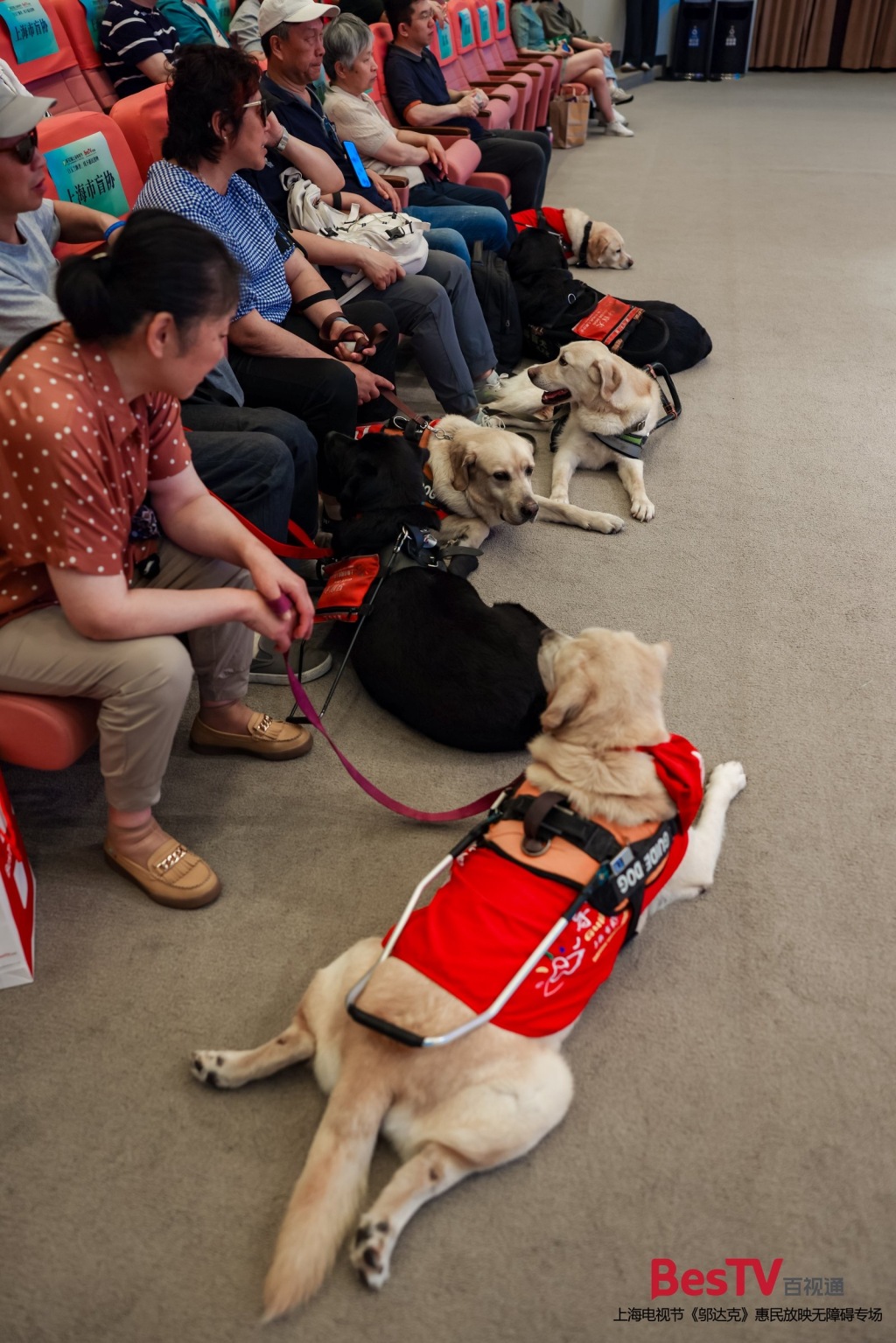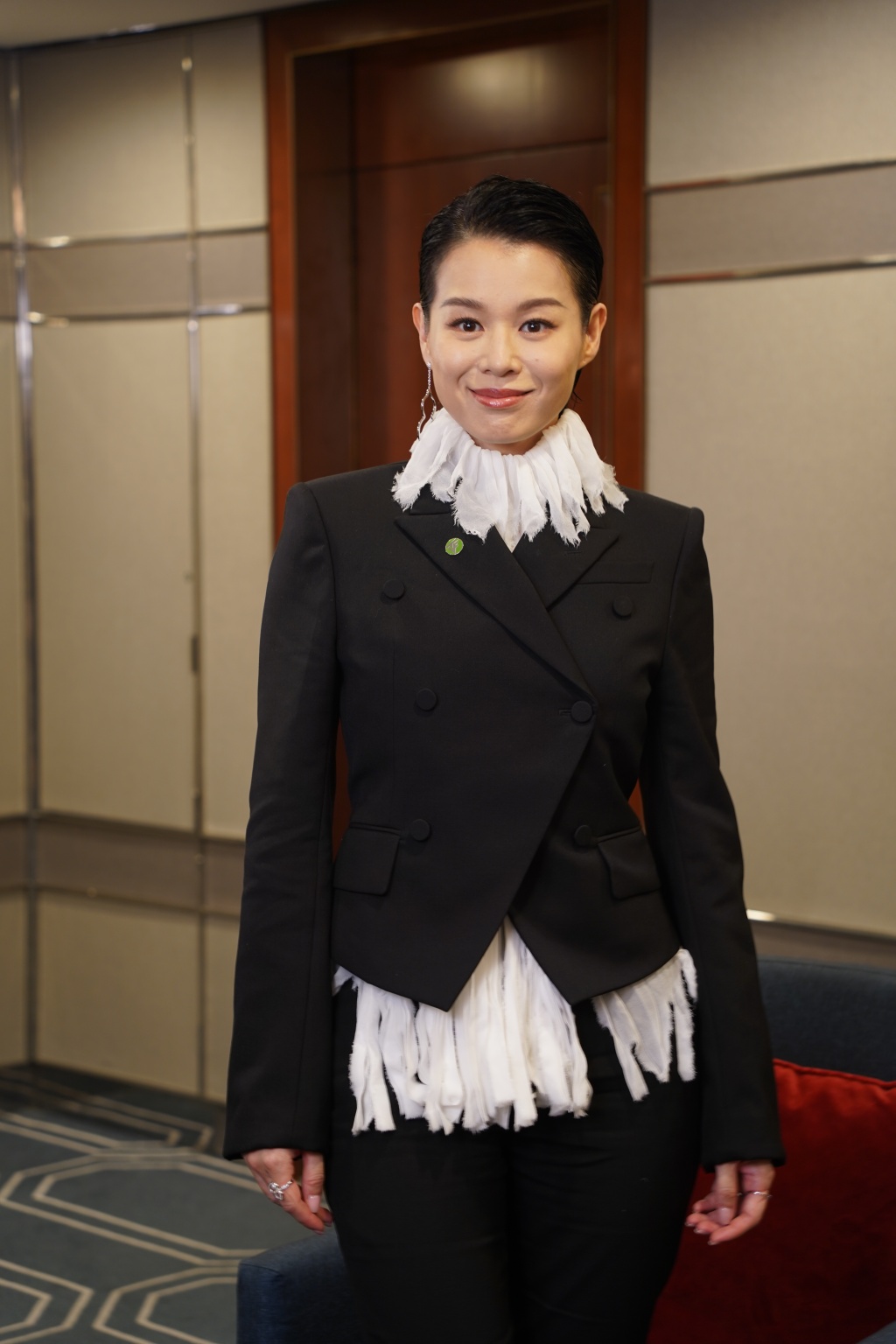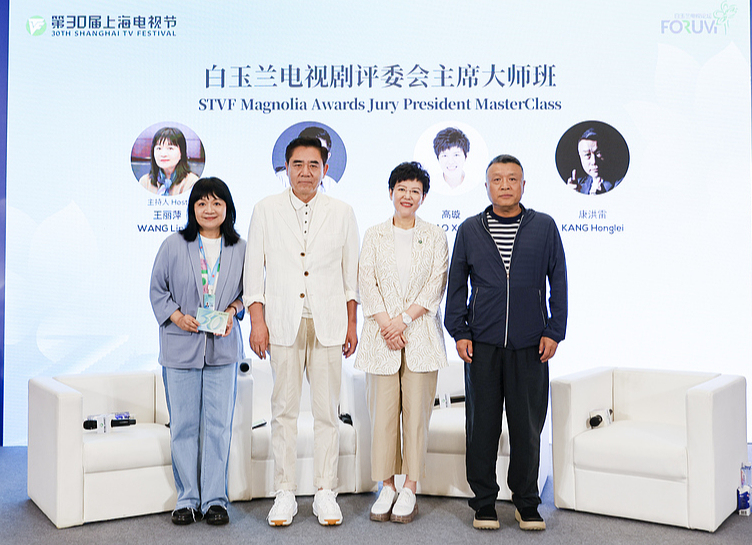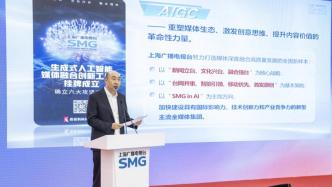
On June 27, the 29th Shanghai TV Festival "Magnolia Dialogue" TV Forum with the theme of "Focusing on the New Quality Productivity of Media - Dialogue on the Use and Governance of AIGC" was held at Shanghai Radio and Television Station. The dialogue was jointly sponsored by Shanghai Radio and Television Station and Shanghai University, and hosted by Shanghai Radio and Television Research Magazine and the School of Journalism and Communication of Shanghai University. It aims to explore the use and governance of AIGC by the media and provide suggestions for the application and development of generative artificial intelligence in the radio and television industry.
On the same day, the "International Intelligent Communication Governance and Strategy Research Center" jointly established by Shanghai Radio and Television and Shanghai University was officially unveiled. At the same time, the "Global Artificial Intelligence Media Development Research Report (2023-2024)" (advance version), "Generative Artificial Intelligence Credibility Index System Report" (advance version), and the First Financial Media Big Model (pre-release version) were released.
Focusing on the current status, challenges and future trends of AIGC in the media industry, the guests delivered keynote speeches from different perspectives. Chen Jiangjiang, Director of the Application Promotion Platform of the National Key Laboratory of China Media Group, gave a detailed interpretation of the "White Paper on the Development of Artificial Intelligence of China Media Group". China Media Group is committed to working with all parties in the industry to jointly create, build and share a media artificial intelligence ecosystem suitable for my country's media industry, and to accelerate the cultivation and development of new quality productivity in the media field.
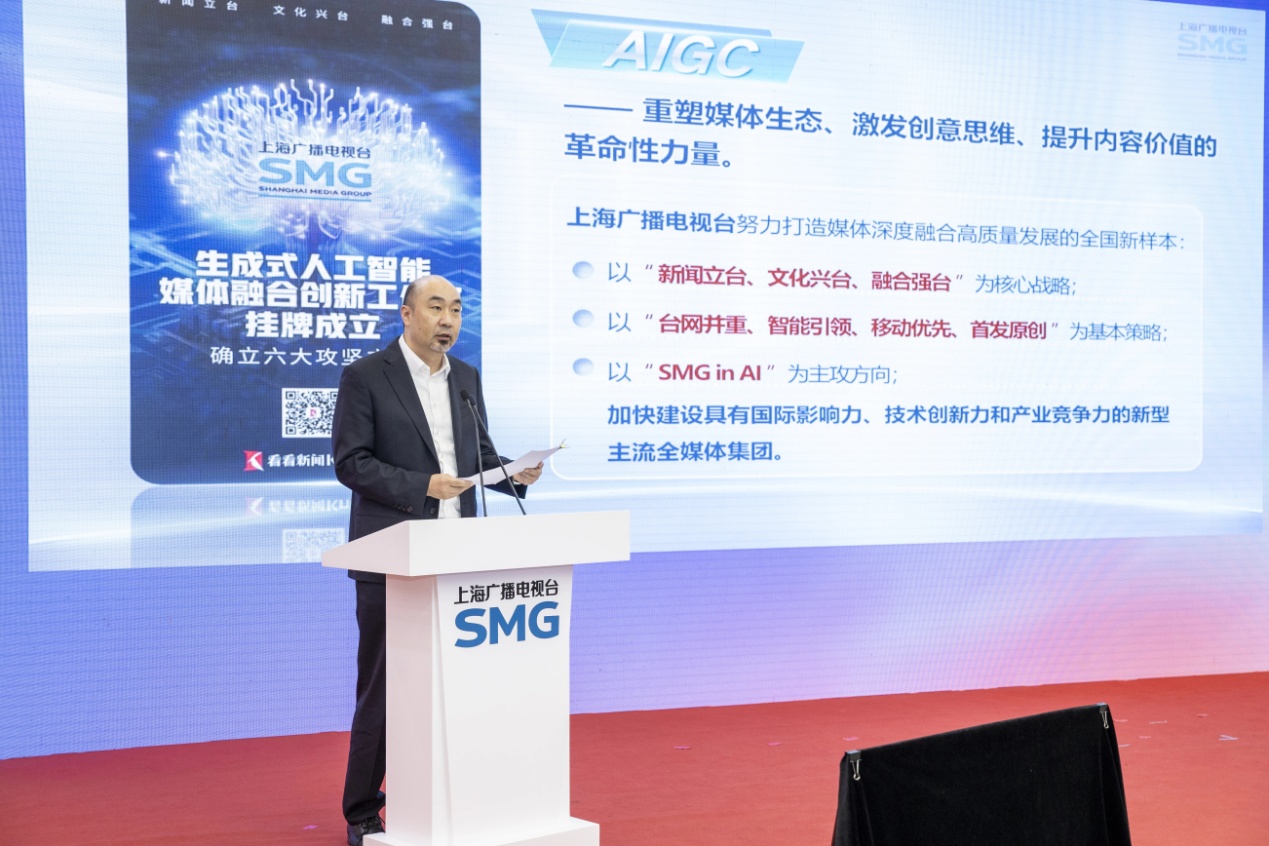
Event site
Song Jiongming, deputy secretary of the Party Committee, director and president of Shanghai Radio and Television Station and Shanghai Culture, Radio, Film and Television Group Co., Ltd., introduced the innovation and responsibility of Shanghai Radio and Television Station under the wave of AIGC. Focusing on "SMG in AI", Shanghai Radio and Television Station has made all-round layout, led by AIGC wisdom, and driven content and product innovation. Regarding the risks and security governance issues of AIGC use, he believes that as a mainstream media, it is necessary to adhere to the concept of developing new quality productivity and to "make good use" and "govern well" AIGC. Shanghai Radio and Television Station has specially formulated the "Station (Group) Artificial Intelligence Use Management Regulations" (Draft for Comments), adhering to the three major concepts of "people-oriented, intelligent for good", "data security, information protection", and "building consensus, collaborative governance".
Industry experts talked about the challenges and opportunities that AI brings to the cultural media industry. Ye Hanghui, general manager of Baidu Smart Cloud Media Business Department, introduced "In the era of big models, Baidu Smart Cloud helps the high-quality development of the media". Baidu Smart Cloud empowers the media industry with big models, and fully injects new intelligent momentum from the four dimensions of creativity, reach, appeal, and productivity. Li Xingye, vice president of SenseTime's Digital Entertainment Division, introduced SenseTime's big model matrix and virtual digital people, and gave a wonderful functional demonstration. At the same time, it also brought new technological breakthroughs in the fields of Wensheng Video and Daily New Big Model. Shu Wenqi, general manager of Tencent Cloud Media and New Cultural and Creative Industry, shared the application of AIGC in Tencent meetings, news, reading, advertising and operations, and proposed an AIGC intelligent body application platform solution for the future of the media industry.
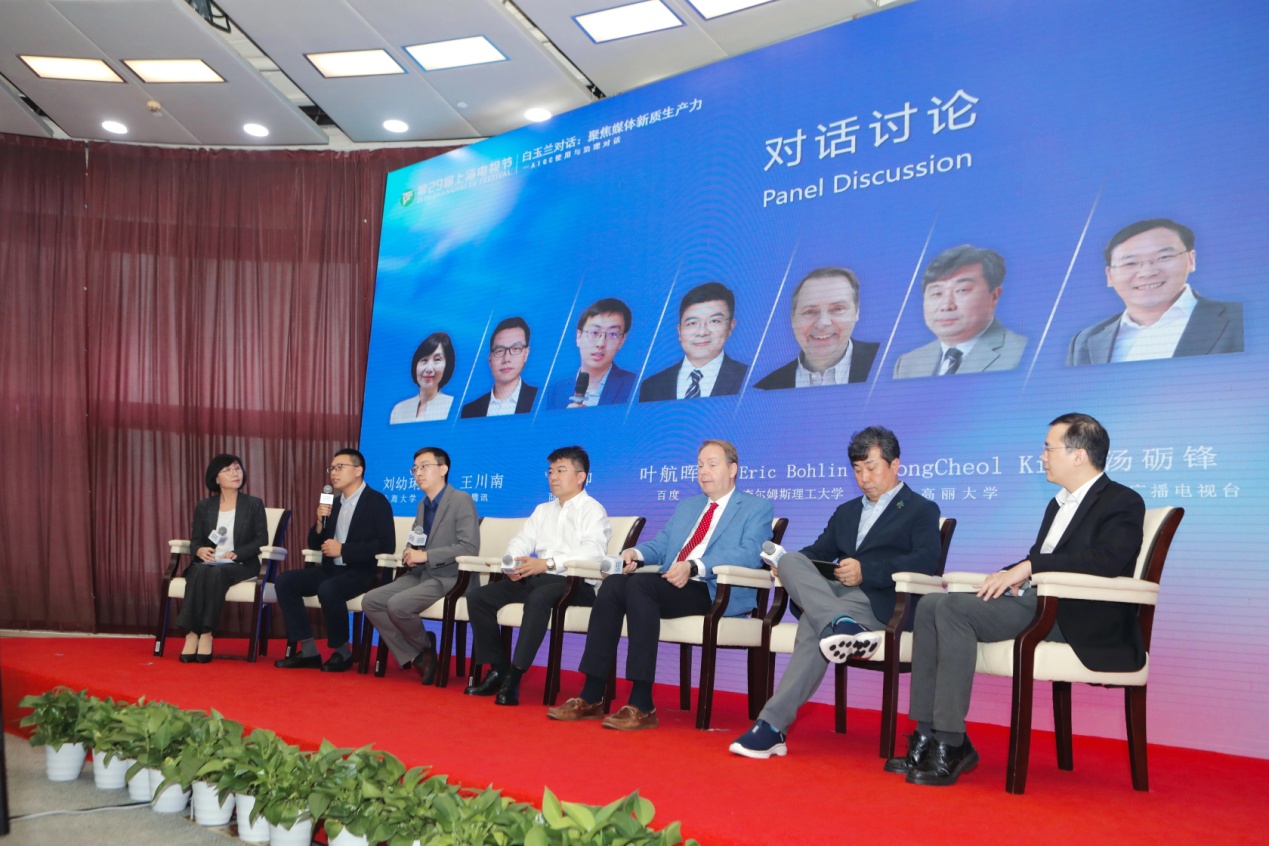
Event site
Academic experts focused on the latest research results on AI governance. Professor Eric Polin from Chalmers University of Technology in Sweden introduced "AIGC Use and Governance: European Cases and Experiences" and interpreted the world's first AI bill, the EU's "Artificial Intelligence Act", exploring value-based and ethical risk assessment methods, and analyzing the trade-offs between different policy options and governance measures. Professor Kim Sung-tie of Korea University in South Korea introduced in detail the application of generative AI in various stages of production in Korea's creative industries through rich cases. In-depth analysis of the current status of the application of generative AI in various fields in South Korea, explore its problems at the legal, ethical and socio-economic levels, and reflect on the harmonious coexistence of humans and AI in the future.
The six guests, including Ye Hanghui, General Manager of Baidu Smart Cloud Media Business Department, Yi Shuai, General Manager of SenseTime Technology Co., Ltd. Overseas R&D Center, Wang Chuannan, General Manager of Tencent Youtu Lab AI Solutions, Eric Polin, Professor of Chalmers University of Technology in Sweden, Kim Sung-tie, Professor of Korea University in South Korea, and Tang Lifeng, Director of the Editorial Office of Shanghai Radio and Television, focused on "AI-generated content, media applications, and ethical issues", combined with AIGC's technical empowerment of the radio and television industry, and launched heated discussions from multiple dimensions such as content production, media ecology, commercial applications, security challenges, and the impact on higher education and academic research. The dialogue discussion was hosted by Liu Youli, Distinguished Professor of Shanghai University.
At the end of the dialogue, Wang Hu, deputy dean and professor of the School of Journalism and Communication of Shanghai University, released the "Global Artificial Intelligence Media Development Research Report (2023-2024)" (advanced version), sharing the global development and application status of artificial intelligence technology, and analyzing and elaborating on the current status of global and domestic artificial intelligence media development from the perspectives of strategy, technology, industry, business and ethical security.
Professor Yu Weihua from the School of Media and Communication of Shanghai Jiao Tong University used the principles of hierarchical analysis and 10 first-level indicators to release the "Generative Artificial Intelligence Content Credibility Assessment Index System Report" (advanced version).
Yang Yudong, editor-in-chief of Shanghai Radio and Television Station Yicai, brought the Yicai Media Big Model (pre-release version). This big model is an AI intelligent body that is based on the basic general corpus and injects more than 1 billion tokens of high-quality financial media data and professional field knowledge to serve the production of financial integrated media content. It is expected to become a powerful financial think tank and assistant in the future, providing investors with first-class financial information services in the ever-changing dynamic process of the global capital market.
